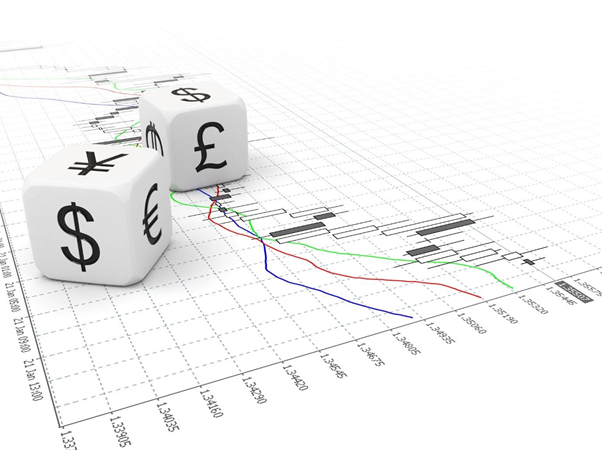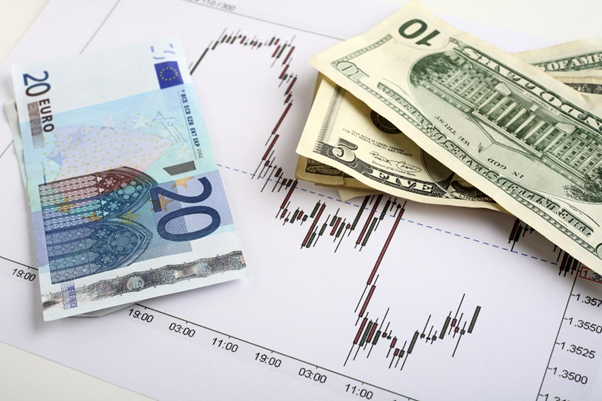Highlights
- Forex trading simply refers to the process of buying and selling of currency pairs, in anticipation of a potential profit.
- It is the biggest market in the world, making it a highly liquid one to easily trade large position sizes.
- Being less prone to manipulation, the forex market has an upper edge compared to the stock market.
The forex (foreign exchange) market is the biggest financial market in the world. According to estimates, daily volume in the global forex market runs into quadrillions. In the forex market, a vast number of currencies are exchanged against one another (known as a currency pair), facilitating an easy conversion. 
Image Source: © Volgarud | Megapixl.com
Now why would someone want to exchange currency? The simple answer is to carry out international trade, which most of the times happens through the US dollar. So, if someone has cash in the form of Chinese yuan and wants to purchase goods from the US, then he will need to have US dollars to make the payment, and this is where the role of the forex market kicks in.
This is the simplest and most common function of the forex market, but there are much more complicated uses of it. For example, to name few
- Financial institutions such as banks or international firms use it to hedge against currency risk.
- Other market participants do speculative trading.
- Some also carry out arbitrage trades to exploit inefficiencies in the market pricing.
However, retail traders/investors and prop trading firms are majorly engaged in trading of these currency pairs, also known as forex trading.
Read More: Discover the Influence of Economic Factors on Forex Trading
So, what exactly is forex trading and who all can do it?
As stated earlier, the forex market is a marketplace where currencies are exchanged (bought and sold). In the forex market, most of the times, traders anticipate a move (appreciation or depreciation) in a currency with respect to another one. To capitalise on this move, they place a bet by buying the currency which is anticipated to move higher or short sell the one expected to move lower.
What are the advantages of trading in the forex market?
After making a position, if the currency appreciates (if bought) then the trader makes a profit and if it depreciates, he will make a loss on his position. You can read more about this in the Daxrobot review.
Similarly, in a sell position, a trader makes a profit if the currency falls in price, and loss if its value rises. This buying and selling of currencies in anticipation of a potential profit is known as forex trading.

Image Source: © Paulcowan | Megapixl.com
If you’re a newbie in the forex market and all this sounds complicated to you, then we’ve got you covered with a simple yet practical example of how forex trading takes place.
Let us say you are bullish on the Euro and expect its value to increase in the near term against the US dollar. You might have your own reasons for your view such as an anticipated move by the European Central Bank (ECB), which could potentially strengthen Euro in the internal market, or maybe a technical breakout on the price charts, etc.
Now an attempt to make a profit out of this move, you can buy the EUR/USD pair, at the current rate, say 1.15, which simply means 1 Euro is worth 1.15 USD. EUR here is the base currency and USD is the quote currency. Now, if EUR/USD pair moves higher by 1%, you would be making a profit, proportional to your position size. However, if your anticipation turns out to be wrong, you will lose money in the same proportion. This is exactly similar to stock trading, the only difference being – here stocks are replaced by forex pairs.
Forex trading is carried out by all major banks in the world, most of the financial institutions, traders, investors, hedgers, prop trading firms, brokerage houses, market makers and a lot more. While most of the big institutions carry out trades in the forwards market or interbank market due to their gigantic volumes, retail traders can participate in forex trading via a recognised exchange of their respective country.
Forex Market has many types of players, such as:
- Investment and Commercial banks
- Hedge funds
- Multinational Corporation
- Investment Managers
- Central Banks
- Individual Investors
So why forex trading? Is it better than trading stocks?
The fundamental nature of asset classes such as stocks, bonds, commodities, or even new-age cryptocurrencies are totally different from one another, requiring a different skillset to trade each one of them. These fundamentals impact crucial aspects of trading such as the volatility of the underlying asset, its ability to trend, liquidity etc.
When it comes to forex trading there are numerous benefits over other asset classes, making it the biggest market in world. Let us have a look at a few of these advantages of trading in the forex market.
- Massive liquidity
One of the most important advantages of trading in the forex market comes from its sheer size. It is estimated that transactions worth trillions take place every day. This mammoth size makes it quite a liquid market. Liquidity refers to an ease with which an asset can be transacted, without distorting the price.
If the market lacks liquidity, there are a smaller number of market participants to buy and sell, it gets difficult for a trader to enter and exit a position with his desired prices. Also, it increases the impact cost for larger orders.
- Low volatility
Volatility refers to the sensitivity of a price change of an asset. Higher the volatility, more erratic would be the price change and vice versa. Unlike stocks which could surge or drop massively in a day, the stability of forex pairs is unmatched.
To put things in perspective, it is rare to see a move of over 1% in a day some of the widely traded pairs such as EUR/USD. Lower volatility reduces the chances of whipsaws, which kicks out traders prematurely from a trade. Hence, forex trading is good for beginners as well.
- High Leverage
Due to lower volatility of forex pairs, many brokers do not hesitate in giving a very high leverage to traders. Leverage essentially means – your broker putting in his money (to some extent) so that you get to trade large contracts with less capital.
This helps to ramp up your returns as you would be able to make a profit on the full contract value, but with less capital. However, volatility is like a two-sided sword, which could even result in high losses if traders are not cautious in using it.
- Less prone to manipulations
Stock markets are infamous for being prone to manipulations. Frauds such as insider trading, pump and dump schemes, or manipulation of prices by a few big hands – are all possible in a market with less volume, as one large trader can easily inflate prices.
However, this is almost impossible in an asset that is traded globally, due to its global demand and supply. In other words, it would require a whole sea of funds to manipulate a market that records around US$4 trillion worth of transaction every day.
- Round-the-clock market
Forex market operates 5 days a week, 24 hours a day in some part of the world. This means once the forex market closes in one country, it would definitely be opened for trading in other countries. This gives a massive opportunity for traders to frequently spot profitable opportunities. It also helps traders to plan for the next day as the quotes come in throughout the day from some part of the world, where the forex market is open.
This is unlike stock markets, which are open only for a few hours each day, and after the country’s stock market closes, the listed shares cannot be traded until the market opens in the same country the next day.
Read More: Interested in forex trading? Here are five key things for beginners

.jpg)




